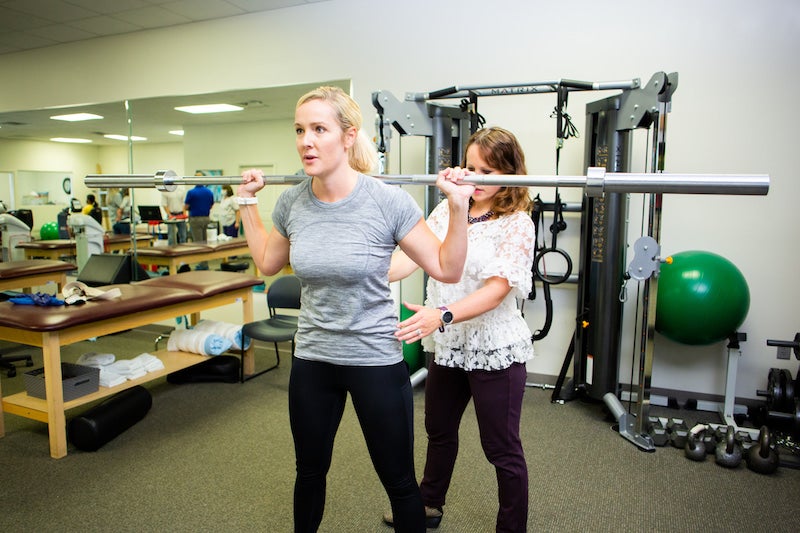Empowering women through health and wellness
Published 11:28 am Wednesday, September 1, 2021

- Stephanie Perez guides a physical therapy patient. (Contributed)
|
Getting your Trinity Audio player ready...
|
By MICHELLE LOVE | Staff Writer
ALABASTER – Nobody understands the importance of women’s wellness better than Dr. Stephanie Perez. It is something she has made the focus of her career, and devoted her life to helping women better understand what it means to be healthy.
Perez is the owner and physical therapist of Empowered Wellness Physical Therapy, where she aids women in physical therapy and women’s health services. Perez provides virtual and in-home consultations throughout the Birmingham area, as well as cities in Jasper, Cullman, Huntsville, Florence and Montgomery.
“I knew I wanted to be a physical therapist after I tore my ACL in high school and had to go through physical therapy myself,” said Perez. “Volleyball was an important part of my life, and I was afraid I would never be able to play again after my knee surgery. I had great physical therapy, recovered, and was able to obtain a scholarship to play collegiate volleyball at the University of Montevallo.”
She received a bachelor’s degree in kinesiology, then went on to receive a doctorate in physical therapy at the University of Alabama at Birmingham. She and her husband, Frankie, lived in Alabaster for five years before moving to Huntsville in 2017. They just recently moved back to the Alabaster area, and Perez said they “are thrilled to be back.”
Perez mainly helps women with their pelvic floor physical therapy, something she said is very important for women to focus on especially after having children.
“I became very interested in pelvic floor physical therapy after having children of my own,” she said. “After giving birth to my children, I wanted to make sure I took care of my body, and progressed safely back into my exercise routine. There is not much information given to moms about working out while pregnant and pelvic floor recovery after birth, so it became my passion to be able to provide education and guidance to women.”
A pelvic floor physical therapist evaluates the muscles of the pelvic floor, and Perez said like any other muscle in the body, if it is not taken care of it can be detrimental to physical health and wellbeing.
“The pelvic floor is a muscular hammock that sits in the bottom of our pelvis and helps to hold our organs up, provide sexual function and continence, and perform core stability,” Perez said. “They are present in men and women. Just like any other muscle in the body, injuries can occur, weakness can develop, or tension and trigger points can build resulting in pain and dysfunction.”
As a pelvic floor therapist, Perez evaluates her patients’ muscle strength and tension through an internal assessment, which will evaluate overall coordination. Based on the results, she comes up with a tailored treatment plan that focuses on improving symptoms (such as incontinence or pain) and reaching personal goals.
Perez added the benefits of pelvic floor physical therapy are vast and include things like core strengthening, resolving diastasis recti (separation of the muscles along the midline of the abdomen), decreasing pain during intercourse and reducing endometriosis symptoms.
Perez said part of her job is correcting common misconceptions associated with dysfunction in women’s health.
“A common misconception associated with any kind of dysfunction surrounding women’s health is, ‘Just do kegel [exercises].’ More often than we realize, the pelvic floor muscles are actually too tight, which inhibits their ability to contract well, or be strong. If you continually tighten/contract the muscles, as in kegels, you won’t actually fix the underlying problem, and could make it worse.”
Ultimately, Perez wants her work to inform women they are not alone in certain issues, particularly problems that occur after childbirth.
“Birth is beautiful, and afterwards there is a lot of care and attention on the new addition, making sure baby is accommodating well to the new world and is growing strong and healthy. But what about mom? Typically, new moms have one appointment with a physician around six to eight weeks after delivery. This appointment is usually quick, and doesn’t involve much more than making sure we are still alive and functioning well. There are many challenges that a postpartum body can experience and these are often not discussed due to embarrassment, or just swept under the rug with a, ‘You had a baby so you just have to deal with it,’” she said.
Perez said she loves “helping moms get back to living the life they desire and achieving their goals,” and loves to celebrate with them once they achieve their personal goals.
“I work with women of all ages and all fitness backgrounds. Whether you want to be able to walk around the block or lift heavy weights in the gym, there is help for everyone,” she said. “I will hold hands with you while you are walking through a difficult time and help you get through to the other side.”









